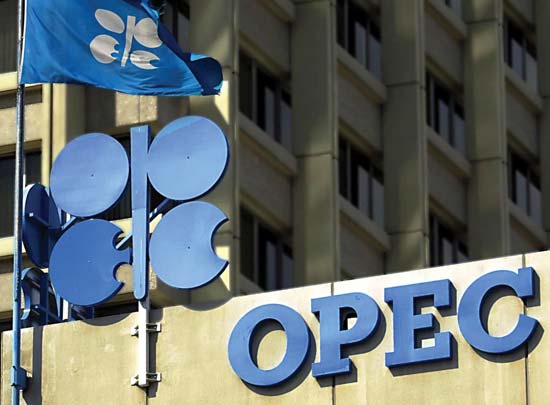OPEC agreed to the outline of a deal that will cut production for the first time in eight years, surprising traders who had expected a continuation of the pump-at-will policy the group adopted in 2014 at the instigation of Saudi Arabia.
Oil jumped more than 5 percent in New York after ministers said the group agreed to limit production to a range of 32.5 to 33 million barrels a day.
The deal will reverberate beyond the Organization of Petroleum Exporting Countries. It will brighten the prospects for the energy industry, from giants like Exxon Mobil Corp. to small U.S. shale firms, and boost the economies of oil-rich countries such as Russia and Saudi Arabia. For consumers, however, it will mean higher prices at the pump.
The agreement was possible because Iran will be exempt from capping production, a major concession by Saudi Arabia, the group’s dominant producer. Still, many of the details remain to be worked out and the group won’t decide on targets for each country until its next meeting at the end of November.
The lower end of the production target equates to a nearly 750,000 barrel-a-day drop from what OPEC said it pumped in August — more than half the forecast increase in global oil demand this year.
“The cut is clearly bullish,” said Mike Wittner, head of oil-market research at Societe Generale SA in New York. “What’s much more important is that the Saudis appear to be returning to a period of market management.”
The agreement also signals a new phase in relations between Saudi Arabia and Iran, which have clashed on oil policy since 2014 and are backing opposite sides in civil wars in Syria and Yemen. The deal indicates that Riyadh and Tehran, with the mediation of Russia, Algeria and Qatar, were able to overcome the differences that sunk another proposal to cap production earlier this year.

“We decided the range of production for OPEC of 32.5 to 33 million barrels a day should be divided between OPEC member countries,” Iranian minister Bijan Namdar Zanganeh said after the meeting.
Brent crude surged as much as 6.5 percent to $48.96 a barrel in London. The shares of Exxon, the world’s largest publicly listed oil company, climbed 4.4 percent, the biggest one-day increase since February.
High Stakes
The stakes for OPEC, which pumps 40 percent of the world’s oil, are high as the International Energy Agency has warned of a weak petroleum market next year. Ian Taylor, the head of Vitol Group BV, the world’s largest oil-trading house, said that the crude market could remain oversupplied until 2018 unless producing countries stop flooding the market.
“I cannot see a good reason for a major increase in the price of oil” since the market remains “way oversupplied,” Taylor told a Bloomberg conference in London.
Saudi Arabia’s willingness to do a deal, in particular, demonstrates the economic pain lower oil prices has caused producers. The world’s largest exporter is facing a record budget deficit this year, is burning through foreign exchange reserves and this week announced it will have to halt bonus payments to civil servants.
After a two-year flirtation with free oil markets, the deal in Algiers signals a “return to supply management,” said Yasser Elguindi, a director at consultancy firm Medley Global Advisors, who is in Algiers monitoring the OPEC meeting. “This is a case where lower volume from Saudi Arabia will mean higher revenues if prices go up.”
Russian Production
As well as agreeing the details of the production accord among themselves, OPEC also faces the task of convincing producers outside the group, most importantly Russia, to cap their own output.
As OPEC agreed to limit its output, Russia smashed a post-Soviet oil-supply record, pumping 11.1 million barrels a day in September, up 400,000 from August, according to preliminary estimates.
Some are skeptical, however, about how far OPEC will follow through on the commitments made at Algiers.
“OPEC showed once again it can deftly manage market sentiment with verbal intervention,” said Bob McNally, founder of oil consultancy firm The Rapidan Group in Washington. “As to whether it will implement real supply management, details and time will tell but that is hardly certain from the Algiers meeting outcome.”

